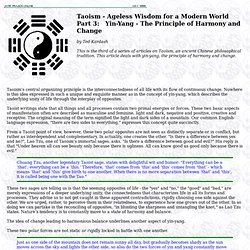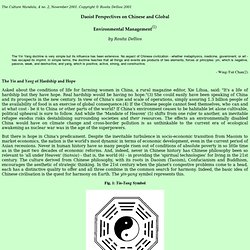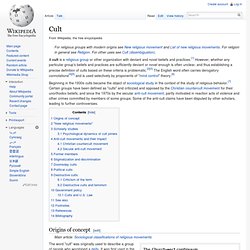

Medieval. Buddhism Archive. Edu : Occult. Hermenutics. Gnosticism. Christian & Moral Ethics. Catholic Resources.
Scientology. Taoism - Ageless Wisdom for a Modern World - Part 3. Taoism’s central organizing principle is the interconnectedness of all life with its flow of continuous change.

Nowhere is this idea expressed in such a unique and exquisite manner as in the concept of yin-yang, which describes the underlying unity of life through the interplay of opposites. Taoist writings state that all things and all processes contain two primal energies or forces. These two basic aspects of manifestation often are described as masculine and feminine, light and dark, negative and positive, creative and receptive. The original meaning of the term signified the light and dark sides of a mountain. Our common English-language expression, "there are two sides to everything," expresses this concept quite succinctly.
From a Taoist point of view, however, these two polar opposites are not seen as distinctly separate or in conflict, but rather as interdependent and complementary. The idea of change leading to harmonious balance underlines another aspect of yin-yang. Daoist Perspectives on Chinese and Global Environmental Management. The Culture Mandala, 4 no. 2, November 2001.

Copyright © Rosita Dellios 2001 Daoist Perspectives on Chinese and Global Environmental Management(1) by Rosita Dellios The Yin and Yang of Hardship and Hope Asked about the conditions of life for farming women in China, a rural magazine editor, Xie Lihua, said: "It's a life of hardship but they have hope. But there is hope in China's predicament. Fig. 1: Yin-Yang Symbol Strategies for Survival Specifically, Daoism realigns the politics of power over nature to a relationship of cooperation, Confucianism concerns itself with the cultivation of harmonious human relations, and Buddhism instructs on behaviours conducive to survival of the biosphere.(7) How to survive and prosper among the 'myriad things' of Earth in accordance with the moral law of Heaven forms the crux of Chinese strategic philosophy.(8) 'Seek truth from the facts,' exhorted Deng Xiaoping in a return to traditional Chinese pragmatism.
The Sino-Global Nexus in 21st Century Life Floods.
Cult. A cult is a religious group or other organization with deviant and novel beliefs and practices.[1] However, whether any particular group's beliefs and practices are sufficiently deviant or novel enough is often unclear, and thus establishing a precise definition of cults based on these criteria is problematic.[2][3] The English word often carries derogatory connotations[4][5] and is used selectively by proponents of "mind control" theory.[6] Beginning in the 1930s cults became the object of sociological study in the context of the study of religious behavior.[7] Certain groups have been defined as "cults" and criticized and opposed by the Christian countercult movement for their unorthodox beliefs; and since the 1970s by the secular anti-cult movement, partly motivated in reaction acts of violence and other crimes committed by members of some groups.

Some of the anti-cult claims have been disputed by other scholars, leading to further controversies. Origins of concept[edit] Howard P.
Pagan influance. Judaism, Jewish mysticism. Masonic. Bybelstudie. Bible origins. .bodycard 2006.